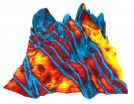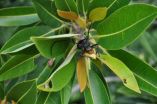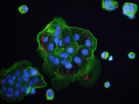(Press-News.org) Claims that most species will go extinct before they can be discovered have been debunked in the latest issue of Science, by researchers from The University of Auckland, Griffith University, and the University of Oxford.
The scientists show that the claims are based on two key misconceptions: an over-estimation of how many species may exist on Earth, and the erroneous belief that the number of taxonomists (people who describe and identify species) is declining.
"Our findings are potentially good news for the conservation of global biodiversity," says lead author Associate Professor Mark Costello from The University of Auckland's Leigh Marine Laboratory, who published the work with Professor Nigel Stork from Griffith University and Professor Bob May from Oxford.
The authors propose that there are 5 +/- 3 million species on Earth – far fewer than has been widely believed – of which 1.5 million species have been named. This re-affirms previous estimates by the three authors, which spanned the upper and lower reaches of this range.
"Over-estimates of the number of species on Earth are self-defeating because they can make attempts to discover and conserve biodiversity appear to be hopeless," says Dr Costello. "Our work suggests that this is far from the case. We believe that with just a modest increase in effort in taxonomy and conservation, most species could be discovered and protected from extinction."
The authors conclude that there have never been so many people describing new species – including professionals and amateurs, the number may near 50,000. And the community continues to grow, in large part due to the development of science in Asia and South America, regions that are rich in biodiversity and where many new species are being discovered.
While the research suggests that species are more likely to be discovered than to go extinct, the authors do not underplay the seriousness of the threats to species and their habitats. The combination of over-hunting, habitat loss and climate change, now occurring at both local and global scales, mean that extinction rates could increase very rapidly in the future.
Dr Costello says that the discovery and naming of species is critical to their conservation. Naming a species gives formal recognition to its existence, making its conservation far easier. The process of discovery, including exploration of remote and less studied habitats, also provides the evidence to underpin conservation efforts.
Amongst the authors' recommendations to increase the rate of species discovery are: getting more people involved in the work; international coordination of exploration and specimen collections; the development of freely available online databases; and financial support from governments and other organisations for these efforts.
###The current research is published in the latest issue of Science: Costello MJ, May RM, Stork NE. (2013) Can we name Earth's species before they go extinct?
New Year brings (potentially) good news for conservation of species on Earth
2013-01-25
ELSE PRESS RELEASES FROM THIS DATE:
Organic ferroelectric molecule shows promise for memory chips, sensors
2013-01-25
At the heart of computing are tiny crystals that transmit and store digital information's ones and zeroes. Today these are hard and brittle materials. But cheap, flexible, nontoxic organic molecules may play a role in the future of hardware.
A team led by the University of Washington in Seattle and the Southeast University in China discovered a molecule that shows promise as an organic alternative to today's silicon-based semiconductors. The findings, published this week in the journal Science, display properties that make it well suited to a wide range of applications ...
HIV-like viruses in non-human primates have existed much longer than previously thought
2013-01-25
Viruses similar to those that cause AIDS in humans were present in non-human primates in Africa at least 5 million years ago and perhaps up to 12 million years ago, according to study published January 24 in the Open Access journal PLOS Pathogens by scientists at Fred Hutchinson Cancer Research Center. Until now, researchers have hypothesized that such viruses originated much more recently.
HIV-1, the virus responsible for AIDS, infiltrated the human population in the early 20th century following multiple transmissions of a similar chimpanzee virus known as SIVcpz. Previous ...
Bats split on family living
2013-01-25
For the tiny Daubenton's bat, the attractions of family life seem to vary more with altitude than with the allure of the opposite sex.
For more than a decade, a team led by Professor John Altringham from the University of Leeds' School of Biology has studied a population of several hundred bats along a 50-km stretch of the River Wharfe. They monitored roosts in Ilkley and Addingham, upstream in the market town of Grassington and higher still in the villages of Kettlewell and Buckden.
The researchers found that all Daubenton's bats in nursery roosts in lowland areas ...
Extinction rates not as bad as feared ... for now
2013-01-25
Concerns that many animals are becoming extinct, before scientists even have time to identify them, are greatly overstated according Griffith University researcher, Professor Nigel Stork.
Professor Stork has taken part in an international study, the findings of which have been detailed in "Can we name Earth's species before they go extinct?" published in the journal Science.
Deputy Head of the Griffith School of Environment, Professor Stork said a number of misconceptions have fuelled these fears, and there is no evidence that extinction rates are as high as some have ...
Organizing human specimen collections: Getting the best out of biobanks
2013-01-25
The diversity of biobanks, collections of human specimens from a variety of sources, raises questions about the best way to manage and govern them, finds a study published in BioMed Central's open access journal Genome Medicine. The research highlights difficulties in standardizing these collections and how to make these samples available for research.
Biobanks have been around for decades, storing hundreds of millions of human specimens. But there has been a dramatic increase in the number of biobanks in the last ten years, since the human genome sequencing project. ...
Immune cell suicide alarm helps destroy escaping bacteria
2013-01-25
CHAPEL HILL, N.C. – Cells in the immune system called macrophages normally engulf and kill intruding bacteria, holding them inside a membrane-bound bag called a vacuole, where they kill and digest them.
Some bacteria thwart this effort by ripping the bag open and then escaping into the macrophage's nutrient-rich cytosol compartment, where they divide and could eventually go on to invade other cells.
But research from the University of North Carolina School of Medicine shows that macrophages have a suicide alarm system, a signaling pathway to detect this escape into ...
Out-of-pocket costs for breast cancer probably manageable for most Canadian women
2013-01-25
Out-of-pocket costs resulting from breast cancer care in the year following diagnosis are likely manageable for most women, but some women are at a higher risk of experiencing the financial burden that comes from those costs in Canadian breast cancer patients, according to a study published January 24 in the Journal of the National Cancer Institute.
While extensive information about the level of out-of-pocket costs after early breast cancer diagnosis has been unavailable until now, the costs resulting from the disease and the effects the costs have on family financial ...
Fruit and vegetable intake is associated with lower risk of ER- breast cancer
2013-01-25
There is no association between total fruit and vegetable intake and risk of overall breast cancer, but vegetable consumption is associated with a lower risk of estrogen receptor-negative (ER-) breast cancer, according to a study published January 24 in the Journal of the National Cancer Institute.
The intake of fruits and vegetables has been hypothesized to lower breast cancer risk, however the existing evidence is inconclusive. There are many subtypes of breast cancer including ER- and ER positive (ER+) tumors and each may have distinct etiologies. Since ER- tumors, ...
Spotting fetal growth problems early could cut UK stillbirths by 600 a year
2013-01-25
The authors say spotting it early could substantially reduce the risk, and this needs to become a cornerstone of safety and effectiveness in antenatal care.
Stillbirth rates in the United Kingdom are among the highest in developed countries. They have often been considered unexplained and unavoidable, and their rates have changed little over the last two decades.
Recently, doctors have found that many stillborn babies fail to reach their growth potential, prompting a renewed focus on what causes fetal growth restriction. So a team of researchers at the West Midlands ...
Scientists discover how epigenetic information could be inherited
2013-01-25
New research reveals a potential way for how parents' experiences could be passed to their offspring's genes. The research was published today, 25 January, in the journal Science.
Epigenetics is a system that turns our genes on and off. The process works by chemical tags, known as epigenetic marks, attaching to DNA and telling a cell to either use or ignore a particular gene.
The most common epigenetic mark is a methyl group. When these groups fasten to DNA through a process called methylation they block the attachment of proteins which normally turn the genes on. ...


